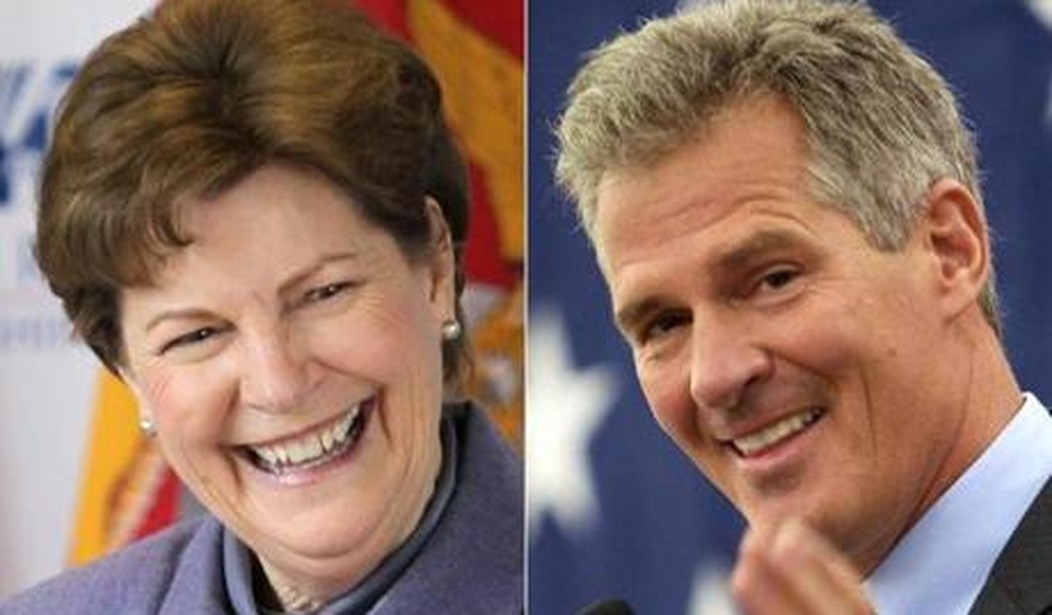The Oct. 21 debate between Scott Brown and Sen. Jeanne Shaheen (D-N.H.) started cordial enough, but digressed into attacks as their time on the stage expired.
The two agreed on a breadth of issues, including a travel ban as a means of stemming potential Ebola infections, not reclassifying marijuana from its Schedule 1 status or allowing its use recreationally and the need for better healthcare for veterans. Their policies diverged, though, on the hot-button issues that have been prominent throughout this race, such as the Affordable Care Act and immigration.
Shaheen said that the ACA, a bill for which Brown has repeatedly said Shaheen was the “deciding vote,” was “real progress” and an accomplishment she was “proud of.” She said that Brown’s assertion that he would move to repeal the bill would lead to the loss of insurance for “tens of thousands” of New Hampshire citizens and that he doesn’t have a plan to replace that lost coverage.
Brown, who did not offer an alternative plan during the debate, said that “Obamacare is not the only answer” and said the incumbent didn’t even bother to read the legislation, instead blindly following President Obama, like she does “99 percent of the time.”
“We address pre-existing care, covering kids to a certain age, dealing with catastrophic care and coverage – there are all sorts of things we can address,” Brown said. “We can develop a plan that works for us… Had [Shaheen] read [the bill] she would have understood that three-quarters of a trillion dollars in cuts come from our seniors’ Medicare.”
He also reminded the audience that the business mandate takes effect after the upcoming election and that the mandate will “crush businesses and individuals.”
“Their care and coverages have gone down and it is real,” Brown warned.
Shaheen argued that repealing the bill would send the country back to the time where insurance companies could choose not to provide coverage for pre-existing conditions or cut benefits when sick people reached their lifetime limits.
“We don’t want to go back to a time when health insurance companies determine what kind of care people get,” she said.
Shaheen did say that if she were able to make changes to the law she would appoint an independent CEO and advisory committee to oversee the website.
“We saw some issues with the rollout of the website,” she said.
The other major point of contention between the opponents is, and has been, immigration. During the debate, Brown said that border control was not only important to keep out illegal immigrants and protect jobs but also to prevent ISIS from entering the country and succeeding in their ultimate goal of “plant[ing] a flag in the White House.”
“Our goal is to make sure that doesn’t happen,” Brown said. “The clearest way to handle that is to make sure we close the border.”
Shaheen agreed that the threat from ISIS is “very real” but said that the best way to handle the militants is to strengthen the coalition fighting them. She disagreed with Brown that an “occupying force” should have been left in Iraq.
With HB-1 visas likely on the horizon, the candidates each offered their take on the plan. Shaheen called the current system “broken.”
“[The visa system] is not working now for the tourism industry here, for our farming industry here, for our high tech companies,” Shaheen said. “The [immigration] bill that we passed starts first with addressing security at the border.”
Brown said he wouldn’t have voted for that legislation because it provided incentives for illegal immigration during the “coming out period” and he did not agree with the language that expanded the definition of a refugee.
“I cannot provide EBT cards, preferential housing and other benefits for people who have broken our laws,” Brown said. “[The bill] immediately gives an opportunity for the president to authorize 11 million people to get jobs. I want to fight for jobs for people in New Hampshire.”
He said that Shaheen’s legislative record when it comes to businesses proves she is not working to bring jobs to the state. He says the senator has a zero rating with the National Federation of Independent Business (NFIB) and an “F” with the Chamber of Commerce.
Shaheen jumped on Brown holding up her NFIB rating as evidence that she is bad for businesses, saying that the group is funded by the Koch Brothers and drawing applause from the audience. She said she crafted the Small Business Jobs Act and voted for the American Jobs Act, both of which Brown voted against while Massachusetts senator.
The candidates started actively arguing when the debate moved on to the topic of energy. Brown claimed that Shaheen was against nuclear energy, to which the incumbent quickly interjected, saying, “No, I’m not.”
“Where did you get that?” she asked Brown.
“Senator, when the Seabrook Nuclear Power Plant was in effect you made an effort to stop it,” Brown responded.
“No, I didn’t,” Shaheen shot back.
“Senator, with respect you did,” Brown said.
“I was not in office at the time,” Shaheen said, prompting uproar from the gallery.
Brown then tried to corner her regarding raising the national energy tax, a charge that she says independent fact-checkers have called “false.”
Shaheen closed the debate with a scathing critique of her opponent’s intentions for gunning for her seat.
“Senator Brown, when he lost his race, he didn’t move to New Hampshire and say ‘I want to get involved in this state.’ He thought about running for the Senate again… Then he thought about running for governor of Massachusetts, then he went to Iowa and talked about running for president,” Shaheen said. “Well, I don’t think New Hampshire is a consolation prize.”









Join the conversation as a VIP Member